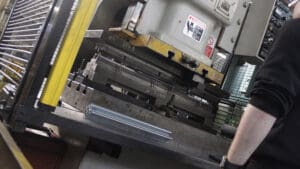
The Confederation of British Metalforming (CBM) has welcomed Jaguar Land Rover’s (JLR) staged return to production and the launch of a funding stream to stabilise suppliers — but warned that serious liquidity problems continue to threaten smaller firms deeper in the UK automotive supply chain.
CBM President Stephen Morley said the carmaker’s payment scheme was a “welcome boost to liquidity” for top-tier suppliers but cautioned that the benefits were not reaching tier 2, 3 and 4 businesses.
“JLR is to be applauded for its hard work in getting funds in place and for producing a workable payment scheme,” Morley said. “However, there are still key issues, especially for smaller firms. Understanding what qualifies a supplier for support is paramount, and there is still reliance on the goodwill of tier one suppliers to pass payments down. In some cases, we know this hasn’t happened.”
In a call with CBM leadership, Industry Minister Chris McDonald confirmed that the government had convened major banks to discuss emergency support for firms affected by production delays and supply chain disruption.
Morley said the CBM was “indebted” to the minister for intervening and urged all JLR suppliers to contact their banks to discuss what support could be made available immediately.
“Suppliers further down the chain need urgent liquidity to survive and then to fund the restart of production,” Morley said. “The second hurdle is a gap in sales, which could stretch to ten or twelve weeks — and that could be the real breaking point.”
The CBM said the Growth Guarantee Scheme could be adapted quickly to provide interest-free working capital, helping smaller manufacturers bridge revenue gaps and rehire staff without worsening debt burdens.
Morley said the organisation’s taskforce was in constant dialogue with HM Treasury on longer-term support options.
“It’s already in place and could be modified quickly to be used without the burden of interest costs,” he said. “This would spread the impact of lost revenue and provide the working capital required to restart when orders come through again.”
The CBM argues that it is in lenders’ and the government’s interest to ensure viable firms survive, noting that “the price of saving good companies is far cheaper than losing them”.
Morley warned that even if immediate liquidity concerns are eased, the longer-term cashflow and credit consequences could hamper future investment and growth across the sector.
“If immediate liquidity concerns are alleviated, how does this unwind in the future?” he said. “This situation will have a material impact on cash flow, long-term liquidity and profits. Supplier relationships with lenders could also be affected, influencing access to future facilities.”
He added that addressing these issues was vital to safeguarding the resilience of the UK automotive supply chain, a key pillar of British manufacturing.
